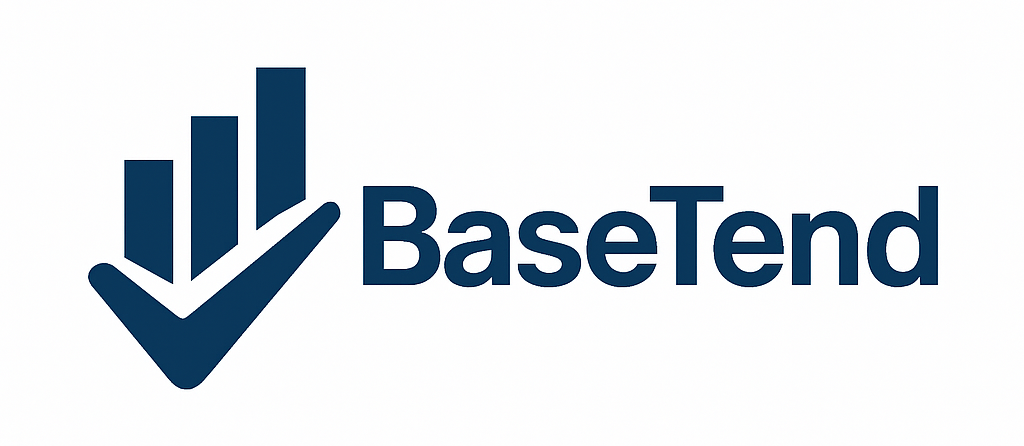How to Stay CRA-Compliant with Your Bookkeeping
What CRA Compliance Really Means for Small Businesses
For many small business owners in Fredericton, bookkeeping can feel like a never-ending task. Between serving customers, managing staff, and keeping up with daily operations, recordkeeping often falls to the bottom of the to-do list. But when tax season arrives, or worse, when the Canada Revenue Agency (CRA) calls for an audit, disorganized books can create serious problems.
Staying CRA-compliant is not just about filing taxes on time. It’s about maintaining accurate, accessible records that prove your business is operating honestly and transparently. Whether you run a small shop downtown, a home-based company in Hanwell, or a contracting business in Oromocto, compliance protects you from fines, penalties, and unnecessary stress.
At BaseTend, we help Fredericton and New Brunswick business owners maintain CRA compliance all year long through smart, organized bookkeeping.
Why CRA Compliance Matters
The CRA’s primary goal is to ensure every Canadian business reports income and expenses correctly. To do that, the agency requires business owners to keep detailed financial records that clearly show where money comes from and where it goes.
Non-compliance can lead to:
- Costly penalties or interest charges
- Delayed tax refunds
- Increased risk of audits
- Missed deductions due to incomplete records
In short, staying compliant is not just about avoiding trouble. It’s about building trust with the CRA and maintaining accurate financial data for your own business growth.
1. Keep Complete and Organized Records
The CRA requires you to keep all financial records for at least six years. This includes invoices, receipts, payroll information, bank statements, and any other documentation related to business transactions.
In Fredericton, where many businesses experience seasonal changes in sales or staffing, maintaining organized records helps you stay consistent year-round.
Action steps:
- Keep both digital and physical copies of important documents.
- Label expenses clearly by category (fuel, advertising, supplies, etc.).
- Record transactions regularly instead of waiting until year-end.
- Use cloud bookkeeping software like QuickBooks or Xero for secure storage.
Having everything organized makes it easier to file taxes, apply for loans, or respond to CRA inquiries without scrambling for paperwork.
2. Track Income Accurately
Every dollar that comes into your business must be accounted for. Whether it’s sales revenue, commissions, or payments from clients, accurate income tracking ensures your tax filings are honest and complete.
For example, a Fredericton catering company might receive payments through multiple channels such as cash, e-transfer, and credit card. Without a proper bookkeeping system, some of those payments could go unrecorded, which creates gaps that the CRA will notice.
BaseTend Tip: Always reconcile your bank deposits with your bookkeeping system to make sure your income totals match what appears in your financial reports.
3. Record Every Business Expense
Business expenses are what keep your taxable income lower. However, the CRA requires proof for every expense you claim. That means every receipt and invoice must be documented and matched to a business purpose.
In Fredericton, common small business expenses include:
- Vehicle mileage and fuel for client meetings
- Office supplies and software subscriptions
- Meals during business discussions
- Advertising and local sponsorships
- Professional services such as accounting or marketing
Keep receipts for all purchases, even small ones. Many business owners lose hundreds of dollars in potential deductions simply because they misplace receipts. With BaseTend’s digital bookkeeping systems, every expense can be uploaded, stored, and categorized for quick access.
4. Separate Business and Personal Finances
Mixing business and personal accounts is one of the biggest mistakes small business owners make. Not only does it make bookkeeping harder, it can also trigger CRA red flags during tax reviews.
Open a dedicated business bank account and credit card for all company transactions. This makes it easy to track expenses and income, especially when reconciling accounts at month-end.
For instance, if you operate a home-based service business in Hanwell, personal grocery purchases or utility bills should never appear in your business ledger unless they are legitimately part of your home office deduction.
5. Stay on Top of GST/HST Filings
In New Brunswick, small businesses must collect and remit HST (currently 15%) on taxable goods and services. The CRA requires businesses to report and pay HST regularly, depending on their filing schedule.
Missing a deadline or miscalculating HST can result in penalties. Regular bookkeeping ensures your sales tax records are always up to date.
BaseTend Tip: Schedule recurring calendar reminders for HST filing dates. Review your HST payable account each month to ensure accuracy. This helps prevent surprises when it’s time to remit to the CRA.
6. Maintain Accurate Payroll Records
If you employ staff, payroll compliance is another critical piece of CRA bookkeeping. Every pay period must accurately account for:
- Employee wages
- Canada Pension Plan (CPP) contributions
- Employment Insurance (EI) premiums
- Income tax deductions
These amounts must be remitted to the CRA on time, along with accurate T4 slips at the end of the year. For Fredericton businesses with seasonal staff, such as landscaping or retail companies, it’s especially important to maintain payroll accuracy even when employees come and go throughout the year.
7. Keep Digital Backups and Secure Data Storage
Fredericton’s weather can be unpredictable, and paper records are vulnerable to damage or loss. CRA rules allow you to keep digital copies of records, as long as they are legible, accessible, and stored securely.
Invest in cloud-based bookkeeping solutions that automatically back up your data. BaseTend uses encrypted systems that protect sensitive information while allowing easy access for tax filing or audits.
This digital approach not only keeps you compliant but also saves time when you need to retrieve records fast.
8. Conduct Regular Internal Reviews
Don’t wait until tax season to review your financials. Schedule monthly or quarterly check-ins to ensure your records are accurate and up to date.
These internal reviews help catch small errors before they become big problems. For example, duplicate entries, missing receipts, or incorrectly categorized transactions can all affect your taxes and CRA filings.
At BaseTend, we recommend a monthly reconciliation process for all Fredericton businesses. Reviewing your books regularly builds consistency and helps you stay prepared for any CRA request or audit.
9. Understand CRA Audit Triggers
Sometimes, audits happen randomly. Other times, they’re triggered by inconsistencies or errors in your filings. Knowing what catches the CRA’s attention can help you avoid unnecessary scrutiny.
Common CRA audit triggers include:
- Reporting income that doesn’t match issued T4 or T5 slips
- Large or inconsistent expense claims
- Significant year-to-year changes in deductions
- Repeated late filings or payment delays
Clean, organized books minimize these risks and make it easy to respond confidently if you ever are audited.
10. Work with a Local Professional
Keeping up with CRA rules takes time, and they change frequently. Working with a professional bookkeeper based in Fredericton ensures you stay compliant without the constant worry of missing something. Local experts understand not just federal CRA regulations but also New Brunswick-specific business realities like local tax incentives and filing cycles.
At BaseTend, we handle:
- Recordkeeping for CRA compliance
- HST and payroll filings
- Audit preparation and documentation
- Year-end cleanup and reporting
When your books are managed by a professional, you gain the peace of mind that comes from knowing everything is accurate, organized, and compliant.
The Cost of Non-Compliance
Ignoring CRA rules or keeping incomplete books can lead to expensive consequences. Even small mistakes can snowball into serious financial issues.
Potential penalties include:
- Late filing fees
- Interest on unpaid taxes
- Disallowed deductions
- Lengthy and stressful audits
For example, one Fredericton retailer was penalized after submitting incomplete HST filings caused by missed invoices. Once BaseTend took over, we organized their records, corrected errors, and set up a reliable system to prevent future issues. Within a few months, their filings were accurate, and they regained full compliance.
CRA Compliance Made Simple
Staying CRA-compliant doesn’t have to be complicated. With organized records, consistent bookkeeping, and support from a local expert, you can focus on your business without fear of missing deadlines or facing audits. Clean, accurate books protect your reputation, improve your decision-making, and ensure your financial health remains strong throughout the year.
At BaseTend, we help small business owners across Fredericton, Oromocto, and Hanwell stay compliant, confident, and ready for anything the CRA sends their way.
📞 Book a free consultation with BaseTend today and let our local experts handle your bookkeeping so you can focus on growing your business.


